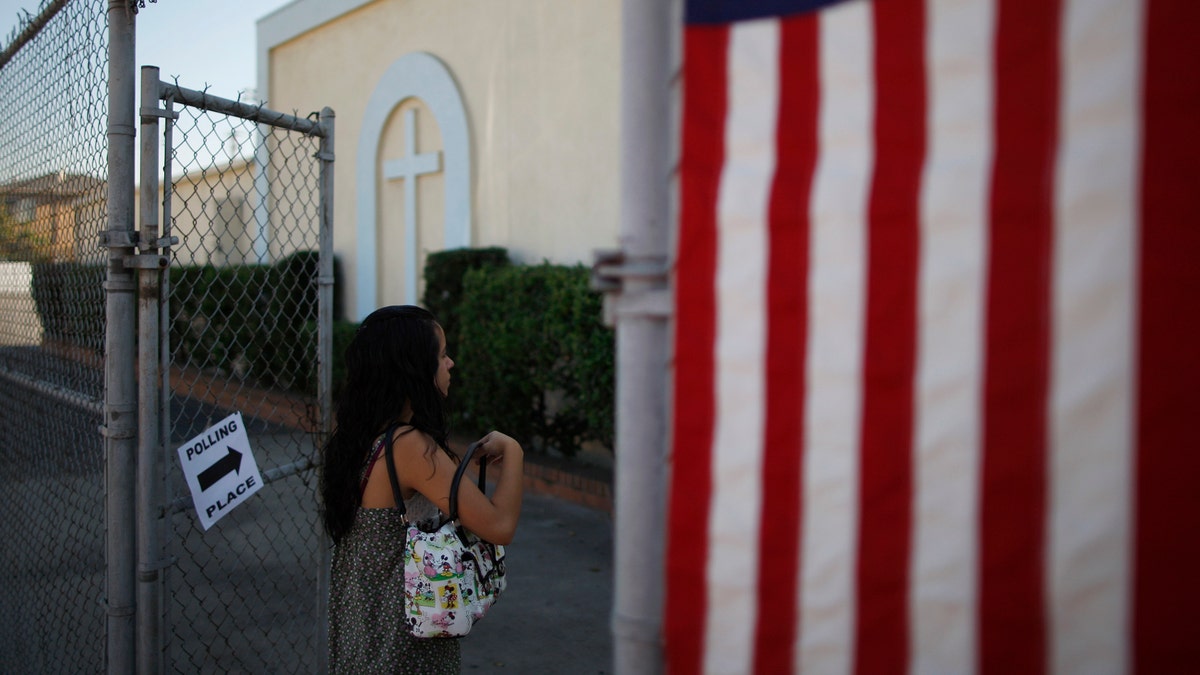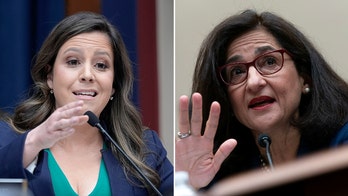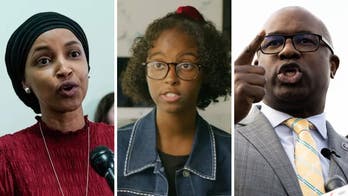
LOS ANGELES, CA - NOVEMBER 6: A woman enters a polling place in the heavily Latino East L.A. area during the U.S. presidential election on November 6, 2012 in Los Angeles, California. The election will decide whether Democrat Barack Obama serves a second term as president of the United States or is replaced by Republican rival, former Massachusetts Gov. Mitt Romney. (Photo by David McNew/Getty Images) (2012 Getty Images)
Immigrants who are not naturalized, and therefore are ineligible to vote, are casting ballots, according to two Virginia political scientists.
The political scientists, who are professors at Old Dominion University, say their research found that while the number of immigrants who vote despite not being naturalized is relatively small, “enough do that their participation can change the outcome of close races.”
The professors, who provided glimpses of their findings in an article they authored for The Washington Post, said that data from the Cooperative Congressional Election Study indicated more than 14 percent of non-citizens who took part in the CCES survey were registered to vote in 2008 and 2010. About 6 percent actually voted in 2008, and 2 percent did so in 2010, the professors said they estimated from the data.
Democrats likely benefitted from this, since immigrants tend to prefer them over Republicans, said the authors, Jesse Richman and David Earnest.
What is more, they noted, “this participation was large enough to plausibly account for Democratic victories in a few close elections.”
“Non-citizen votes could have given Senate Democrats the pivotal 60th vote needed to overcome filibusters in order to pass health-care reform and other Obama administration priorities in the 111th Congress.”
The professors also said that although minimal, Minnesota's 0.65 percent of non-citizen voters could have made the difference in the victory of U.S. Sen. Al Franken, a Democrat.
Non-citizen voters also could have handed President Barack Obama his 2008 win in North Carolina, they said.
Cristóbal Alex, president of the Latino Victory Project, cautioned against an overreaction to the professors' findings.
“Perpetuating the myth of rampant voter fraud is nothing more than a strategy to keep growing minority communities on the sidelines," Alex said to Fox News Latino. "In fact, there is overwhelming evidence that illustrates the crime of voter fraud is incredibly rare."
He said once people acknowledge how it is, they should focus on making sure all eligible voters go out and vote.
“Our democracy works best when campaigns focus on issues that motivate voters, not on strategies to game the system,” Alex said.
The professor's contention comes on the heels of an announcement by the North Carolina Board of Elections that it found 145 names in its voter rolls that belong to immigrants who are in the federal program known as Deferred Action for Childhood Arrivals, or DACA, according to the Winston-Salem Journal.
DACA gives undocumented immigrants brought to the United States as minors a two-year reprieve from deportation as well as the chance to obtain a driver’s license and work permit.
But they are not citizens and not eligible to vote. The Journal said that the number of people registered to vote in North Carolina who should not be may be much higher.
Mark Krikorian, the executive director of the Center for Immigration Studies, a Washington D.C.-based organization that supports tight enforcement, said that it’s no secret that people who are ineligible to vote do so anyway. But Krikorian said that he would like to see more data.
“If the percentages reported in the academic paper are correct, it would mean hundreds of thousands, maybe more than a million, of non-citizens have voted,” Krikorian said to Fox News Latino. “That number seems high to me, and the survey is based on a small sample size, so I’d like to see more research on the question before drawing firm conclusions as to the scope of the problem.”
“But there’s no question it happens, and probably the Motor-Voter law is a big reason for that,” he said.
Such laws, Krikorian said, which were meant to encourage more civic participation by making it easier to register to vote – while doing other things like getting a driver’s license -- have had the unintended consequence of also paving the way for people who are not eligible to cast ballots to do so, sometimes out of confusion.
“If they’re not well-educated, may [legal immigrants who are not naturalized] simply conclude that getting a green card means they’re now citizens,” Krikorian said.
The findings of the Old Dominion University professors also follows a recent U.S. Supreme Court decision to allow Texas to enforce its photo identification law at the polls in the upcoming elections.
The law is the strictest in the nation, permitting only certain types of photo ID at the polls. Gun licenses are included; college IDs are not. It was enacted to cut down on in-person voter fraud, but critics said only two people were convicted of impersonating others at the polls during a recent 10-year period.
Critics of voter ID laws say they dissuade minorities from voting. Supporters say they do not and only protect the electoral system from fraud.
One critic was a federal district judge in Corpus Christi, Judge Nelva Gonzales Ramos, who had struck down the Texas voter ID law. She ruled that it was passed by the Texas state Legislature in 2011 with a "discriminatory purpose" and could disenfranchise about 600,000 voters, a disproportionate number of whom are black or Hispanic.
But if voter ID supporters take the authors’ findings to be ammunition for their argument, the political scientists say: Not so fast.
“We also find that one of the favorite policies advocated by conservatives to prevent voter fraud appears strikingly ineffective,” the authors said. “Nearly three quarters of the non-citizens who indicated they were asked to provide photo identification at the polls claimed to have subsequently voted.”
Echoing Krikorian’s theory, the professors suggested that many legal immigrants have cast votes believing that they are eligible. They found that those with less education were more likely to vote, perhaps out of confusion.
Therefore, the authors said, “An alternative approach to reducing non-citizen turnout might emphasize public information.”
Krikorian added: “What needs to be done is Motor-Voter needs to be altered to no longer require (or even prohibit) registration as part of the driver’s license process, since all green-card holders can (and obviously should be able to) get licenses,” but “there’s no connection between eligibility to vote and eligibility for a license, so they shouldn’t be bundled together.”
And he agreed that legal immigrants must be educated about what their rights are, and how they differ from those who take the oath of citizenship.
“The distinction between a [legal permanent resident] status and U.S. citizenship should probably be made clearer to new green-card recipients.”
Follow us on twitter.com/foxnewslatino
Like us at facebook.com/foxnewslatino




